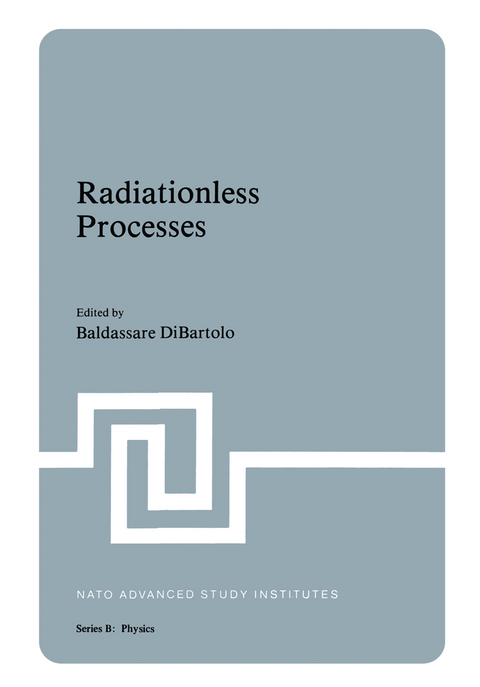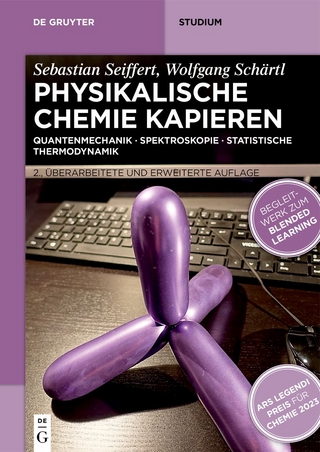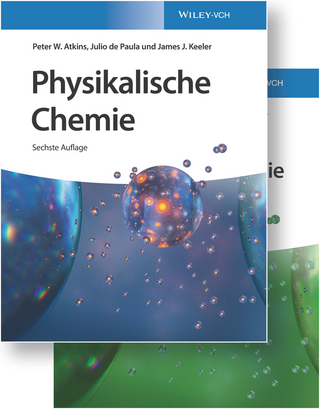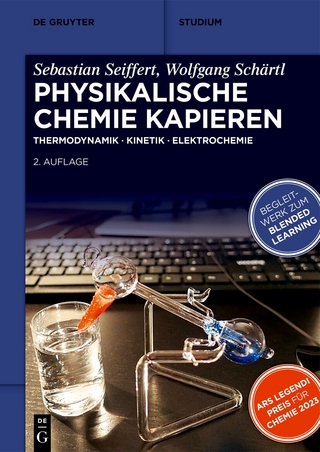
Radiationless Processes
Kluwer Academic/Plenum Publishers (Verlag)
978-0-306-40577-8 (ISBN)
- Titel z.Zt. nicht lieferbar
- Versandkostenfrei innerhalb Deutschlands
- Auch auf Rechnung
- Verfügbarkeit in der Filiale vor Ort prüfen
- Artikel merken
Present Trends in the Theory of Radiationless Processes.- Abstract.- I. Introduction.- II. The Born-Oppenheimer Adiabatic Approximation.- III. The Radiationless Transition.- III.A. Introduction to Radiationless Transitions.- III.B. Some Types of Radiationless Transitions.- III.C. Radiationless Transitions Revisited.- III.D. Radiationless Electronic Transitions.- III.E.The Problem of Radiationless Decay.- IV. Some General Methods in Radiationless Decay Calculations.- IV.A. Introduction.- IV.B. The Landau-Zener-Rosen Method.- IV. C. The Density Matrix Method.- IV.D. Effective Hamiltonian and Correlation Function Methods.- IV. E. Summary.- Appendix A. Glossary of Terms.- Appendix B. Bibliography.- Spectroscopy and Radiationless Deactivation.- Abstract.- I. Introduction.- II. Quantum Theory of a Molecular System.- II.A. The Hamiltonian.- II.B. The Meaning of the Adiabatic Approximation.- II.C. The Adiabatic Approximation and the Role of Symmetry.- III. Radiation Field and Radiative Processes.- III.A. The Radiation Field. Classical Description.- III.B. The Quantum Radiation Field.- III.C. Interaction of a Radiation Field with Charged Particles.- III.D. Absorption and Emission Processes.- III.E. Absorption and Emission in the Electric Dipole Approximation.- IV. Interaction of a Radiation Field with a Molecular System.- IV.A. The Franck-Condon Principle.- IV.B. Probability of Radiative Transitions.- VI.C. Integrated Intensity of a Vibronic Band.- V. Simple Models for Molecular Spectra.- V.A. Radiative Transitions in Diatomic Molecules.- V.B. The Formula of Huang and Rhys.- VI. Nonradiative Processes.- VI.A. Deviations from the Adiabatic Approximation.- VI.B. Mechanisms for Radiationless Transitions.- VI.C. Radiationless Transition Probability per Unit Time.- VII. Multiphonon Relaxation of Ions in Solids.- VII.A. Introduction.- VII.B. Generalization of the Franck-Condon Approximation.- VII.C. Radiationless Transitions.- References.- Spectroscopy and Radiationless Processes in Simple Molecules.- Abstract.- I. General Considerations.- II. Selection Rules.- II.A. Diatomic Molecules.- II.B. Polyatomic Molecules.- III. Examples.- III.A. CN.- III.B. C
2.- III.C. C0
2.- III.D. H
2CO.- IV. Predissociation.- V. Singlet-Triplet Perturbations in Formaldehyde.- References.- Electronic Relaxation in Large Molecules.- Abstract.- I. Prologue.- II. History.- III. Methodology.- IV. Basic Molecular Model.- V. Time Evolution.- VI. Beyond the Golden Rule.- VII. Observables.- VIII. Absorption Lineshapes.- IX. The Rise and Fall of Excited States of Large Molecules.- X. Future Trends.- References.- Intersystem Crossing in Complex Molecules.- Abstract.- I. Introduction.- II. Relaxation of Complex Molecules in the Gaseous Phase.- III. Derivation of Formal Expressions for Excited-State Relaxation Rates.- IV. The Energy-Gap Law in Inter system Crossing.- V. Excitâtion-Energy Dependence of Intersystem Crossing and Internal Conversion.- VI. The Spin-Orbit Interaction in Molecules.- VII. Experimental Observations of Singlet-Triplet Transitions.- VII.A. Existence and Detection of the Triplet State.- VII.B. Methods to Enhance Triplet-Singlet Transitions.- VII.C. Electron Paramagnetic Resonance (EPR) Spectroscopy.- VII.D. Magnetophotoselection.- VII.E. Magnetically-Detected Magnetic Resonance (ODMR).- VIII. Triplet-State Sensitization of Lanthanide Emission in Metallo-Organics.- IX. Intersystem Crossing in Laser Dyes.- X. Triplet States in Biological Systems.- X.A. Proteins.- X.B. Energy Transfer in Models in Biomembranes.- References.- Multiphonon Processes,Cross-Relaxation and Up-Conversion in Ion-Activated Solids, Exemplified by Minilaser Materials.- Abstract.- I. Introduction.- II. Concentration-Independent Processes or One-Center Processes.- II.A. Multiphonon Nonradiative Probabilities.- II.B. B. Radiative Transition Probabilities.- II.C. Discussion.- III. Concentration-Dependent Processes or Multicenter Effects.- III. A. Energy Transfer.- III.B. Cross-Relaxation.- III.C. Up-Conversion by A.P.T.E. Processes.- IV. Application to Stoichiometric Nd3+ Minilaser Materials.- IV. A. The Self-Quenching Limitation of the Quantum Yield. Different Hypotheses.- IV.B. The Role of the Crystal Field and Necessary Criteria for Nd3+ Minilaser Materials.- IV.C. Prediction of Self-Quenching Behavior of Other Ions: Eu3+, Tb3+ and Pr3+.- V. Conclusion.- References.- Radiationless Processes in Luminescent Materials.- Abstract.- I. Introduction.- II. Historical Developments.- III. Energy Transfer.- IV. Qualitative Approach.- IV.A. Two Parabolae Models.- IV.B. Three Parabolae Models.- IV.C. High Pressure Studies.- V. Quantitative Approach.- V.A. General.- V.B. Model Calculations.- V.C. Calculations on Actual Cases.- VI. Conclusion.- References.- Defect Structure in Phosphors by Radiationless Transitions.- Abstract.- I. Introduction.- II. Creation of Defects by Charge Redistribution in Luminescent Materials During Irradiation with Ionizing Radiation.- II. A. Mechanism of Defect Creation.- II. B. Examples.- II. C. Concluding Remarks.- III. Athermal Migration of Defects in Solids.- III. A. Bourgoin-Corbett Mechanism.- III. B. Photo-Induced Defect Reactions.- IV. Radiolysis in Halide Compounds.- IV.A. Background.- IV.B. Simultaneous Creation of F and H Centers.- IV.C. Experimental Facts.- V. Optical Breakdown in Dielectrics.- References.- The Relevance of Nonradiative Transitions to Solid State Lasers.- Abstract.- I. Theory of Laser Operations.- I.A. Quantum Theory of Radiation.- I.B. An Atom in a Radiation Field.- I.C. The Einstein Treatment of Spontaneous and Stimulated Emissions.- I.D. The Gain Coefficient.- I.E. Optical Resonators.- I.F. The Laser Oscillator Condition.- I.G. The Three-Level Laser.- I.H. The Four-Level Laser.- I.I. Pulsed vs. CW Operation.- I.J. Lineshapes and Mode Structures.- II. A Review of Nonradiative Processes.- II.A. General.- II.B. Multiphonon Relaxation.- II.C. Ion-Ion Energy Transfer.- II.D Phonon Broadening of Spectral Lines.- II.E. Vibronic Transitions.- III. Examples from the Laser Literature.- III.A. General.- III.B. The Ruby Laser.- III.C. The Nd3+ Laser.- III.D. The Ho3+ Energy Transfer Laser.- III.E. The LiYF4:Tb3+ Laser.- IV. Current Problems and Opportunities in Solid State Laser Physics.- IV.A. General.- IV.B. Sensitization of Nd.- IV.C. The Pr3+ Laser.- IV.D. The V3+ System.- IV.E. Other Cr3+.- V. Conclusion.- References.- Radiationless Processes in Semiconductors.- Abstract.- I. Introduction.- II. The Auger Effect in Semiconductors.- III. Multiphonon Transitions.- IV. Specific Semiconductor Devices and Phenomena.- IV.A. Solar Energy Photovoltaic Converters.- IV.B. Light Emitting Diodes, LED.- IV.C. Thin Film Electroluminescent Displays.- IV.D. Photoelectrochemical Cells.- V. Conclusions.- References and Related Works.- Long Seminars Photoacoustics and Deexcitation Processes in Condensed Media.- Abstract.- I. Introduction.- II. Photoacoustic Theory.- II.A. Gas-Microphone Signals.- II.B. Piezoelectric Signals.- III. Experimental Methodology.- III.A. Radiation Sources.- III.B. Experimental Chamber.- III.C. Data Acquisition.- III.D. Piezoelectric Detection.- IV. Deexcitation Studies. General Remarks.- V. Fluorescence Studies.- VI. Quantum Efficiencies.- VII. Photochemistry.- VIII. Photosynthesis.- IX. Non-Spectroscopic Studies on Photochemistry.- X. Photoconductivity.- XI. Conclusions.- References.- Radiationless Decay of Excitons.- Abstract.- I. Excitons.- II. Radiationless Processes.- References.- Phonon Coupling to Radiative, Nonradiative, and Energy-Transfer Transitions.- Abstract.- I. Introduction.- II. The Model.- III. Simplifications for Equal Force Constants.- IV. Application to Yb3+ Transitions in Y2O2S.- References.- On the Evaluation of Decay Rates in Solids.- Abstract.- I. Introduction.- II. Historical Note on the Saddle-Point Method.- III. Analysis.- IV. Off-Peak Frequency Modes.- V. Conclusion.- References.- Multiphonon Relaxation in Glasses.- Abstract.- I. Introduction.- II. Analysis of the Experimental Results.- References.- Stimulated Emission in the Presence of Strong Nonradiative Decay in Crystals.- Abstract.- I. Introduction.- II. The Problem of the 3-Micron Laser Action.- III. Laser Action at 3 Microns.- IV. Applications of 3-Micron Crystal Lasers.- References.- The Role of Polarons in Radiationless Processes.- Abstract.- I. Introduction.- II. Electron-Phonon Interactions in Semiconductors.- III. Effective Hamiltonian for e-ph Interaction.- IV. Deformation Potential for Long-Wave Acoustic Phonons.- V. Polar Interaction with Longitudinal-Optical Modes.- VI. Piezoelectric Coupling.- VII. Applications to Radiationless Processes.- Acknowledgement.- References.- Quantum Mechanical Calculation of the Relation Between the Radiationless and Radiative Decay Rates with Application to Molecules in the Gas Phase and Ions in the Solid State and the Consequences for Temperature Quenching (Abstract Only).- Short Seminars (Abstracts).- Vibrational Structure of the Absorption Band of a Jahn-Teller Center in a Non-Conducting Crystal.- Electron Transfer Processes in Photosynthetic Biological Systems.- Theoretical Calculations of the Radiative and Nonradiative Transition Probabilities of F-Centers in Ionic Crystals.- Energy Transfer in Random Systems.- Energy Transfer Processes in Pure Mn2+ Fluoride Systems.- Temperature Behavior of the Blue Fluorescence of ZnS:Tm3+ Crystals.- Ion-Phonon Interactions in Semiconductors.- Contributors.
| Reihe/Serie | NATO Science Series: B ; 62 |
|---|---|
| Zusatzinfo | 95 Illustrations, black and white; XIX, 545 p. 95 illus. |
| Sprache | englisch |
| Themenwelt | Naturwissenschaften ► Chemie ► Physikalische Chemie |
| Naturwissenschaften ► Physik / Astronomie ► Allgemeines / Lexika | |
| ISBN-10 | 0-306-40577-6 / 0306405776 |
| ISBN-13 | 978-0-306-40577-8 / 9780306405778 |
| Zustand | Neuware |
| Haben Sie eine Frage zum Produkt? |
aus dem Bereich


